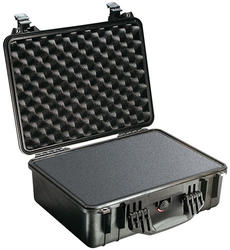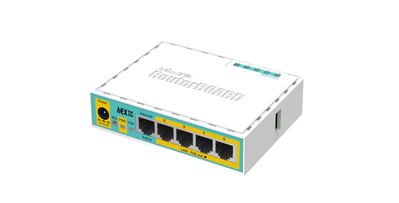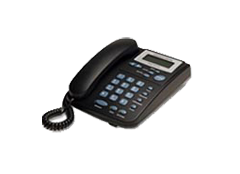Equipment¶
- Mechanical equipments
The first equipment that we had (given by Professor Franck) was a Voyager suitcase, of the brand Pelican.
Here is a picture of our suitcase.
The size of the suitcase is : 50.2 x 40.1 x 18.8 cm. Therefore, the suitcase is carriable by a single person. But, the main quality of this suitcase is that it is very robust (it is resistant to a one meter drop, STANAG 4280 and Def Stan 81-41 certification), it is resistant to high and low temperature (-40°C to 99°C, STANAG 4280 certification) and it is waterproof, and therefore dustproof (IP67 and MIL C-4150J certification).
Therefore, this suitcase cope with our form factor, carriable, resistance and waterproofing constraints.
In order to fix the equipments on the suitcase, we used wooden board as a stand, and plastic collars for fixing the equipments to the stand.
- Network equipments
We choose to put a router in our Microbox, to cope with the scalability and security constraints. The chosen router is a Microtik hEX PoE Lite.
Its size is : 11,3x8,9x2,8 cm. Therefore, it fits in the suitcase perfectly, and we will have plenty of place for placing other equipments.
This router is that it has a routerOS, so we can monitor the different connected equipment, we can parameter the Wifi network, and also other parameters in order to have a secure connection. It also five 10/100 Ethernet ports (one in, four out), so we can connect to it four equipments, plus the Wifi connectivity. It also has a USB port, which is useful for charging a device. This router is reliable, small and is affordable for our project.
The other network equipment is a VoIP phone, compatible with SIP accounts. Professor Franck supplied the Grandstream BT 200 . Its size are 18x22x6.5 cm. 
It enables operators to have phone calls if there is no cell phone connectivity. It is connected to the network by an Ethernet port.
We have also several 10/100 twisted pair Ethernet cable in order to connect the different equipments we have.
- Software equipment
In order to run the Red Cross software, we need an equipment which can do that. We have chosen to integrate a Raspberry PI 3 to our Microbox.
The Raspberry is a small single-board, with a Debian based OS. It has an Ethernet port, 4 USB port, a HDMI port. The OS has to be implemented in a micro SD card. The main issue with this is that it is a bit slow, a single board with a SATA port or an integrated SSD would have been more efficient, but it is also much more expensive and difficult to parameter.
The Raspberry Pi is very scalable, we can connect to it several hardware available on internet, and a lot of specific software can be implemented. So, the Microbox user will be able to in different situation and configuration.
In complement with the Raspberry, we have a case and a 3.5" LCD screen.
!case.jpg§
The size of the case are : 8.6x6.2x0.4 cm. The LCD screen is connected to the Raspberry Pi by the specific connectors.
Due to its size, it will fit our suitcase perfectly.
We have also added a standard multi-socket to supply power to the different equipments. We were a unable to integrate a battery, due to time and budget issues.
Now that we have the exhaustive list of equipments, we have to integrate them in the suitcase, set the network and test it.
